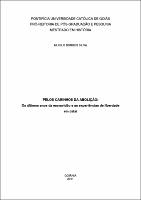| Compartilhamento |


|
Use este identificador para citar ou linkar para este item:
http://tede2.pucgoias.edu.br:8080/handle/tede/2268| Tipo do documento: | Dissertação |
| Título: | PELOS CAMINHOS DA ABOLIÇÃO: Os últimos anos da escravidão e as experiências de liberdade em Jataí |
| Título(s) alternativo(s): | THROUGH THE WAYS OF ABOLITION: The last years of slavery and the experiences of freedom in Jataí |
| Autor: | Silva, Murilo Borges  |
| Primeiro orientador: | Cavalcante, Maria do Espírito Santo Rosa |
| Primeiro membro da banca: | Macêdo Filha, Maurides Batista de |
| Resumo: | Este estudo procura analisar os anos finais da escravidão em Jataí e os primeiros anos da pós-abolição, com o intuito de perceber as diferentes perspectivas de senhores e escravos com o processo da abolição. Nesse sentido, as leituras que se fizeram das fontes intenta evidenciar a dinâmica da escravidão na região, confrontando a ideia, já arraigada na historiografia que sugere que a escravidão em Goiás teria configurações mais amenas do que em outras localidades. Portanto, a partir do diálogo entre documentos como o recenseamento do Brasil de 1872, registros de compra e venda de escravos, cartas de liberdade, inventários e processos crimes, associados a outras fontes como a literatura memorialista foi possível demonstrar as tensões e conflitos entre senhores e escravos que estiveram acirradas especialmente nas décadas de 70 e 80 do século XIX. Nessa perspectiva, vislumbra-se as estratégias dos cativos para confrontar a escravidão e tornarem-se livres, bem como, as táticas desenvolvidas por senhores para burlarem a perda do seu poder moral e tornar o processo abolicionista lento e gradual. Por fim, a pesquisa debruça-se sobre as experiências de senhores e ex-escravos nos primeiros anos da pós-abolição em Jataí. |
| Abstract: | This study aims to analyze the last years of slavery in Jataí and the first years of post-abolition, with the intention to notice the different perspectives of the masters and slaves in the process of abolition. In this sense, the reading that was made through the bibliography tries to point out the dynamic of the slavery in the region, confronting the idea, yet rooted in the historiography which suggests that the slavery in Goiás would have less intense configurations than in other places. However, from the dialogue between documents as Brazil's Census in 1872, registers of buying and selling slaves, freedom letters, inventories, and crime process, associated with other sources as the memoir literature, it was possible to point out the tensions and conflicts between the masters and slaves that were tough especially in the decades of 70 s and 80 s in the XIX century. In this perspective, the captive's strategies to confront the slavery and become free can be detected, as well as, the tactics developed by the masters in order to manipulate the loss of their moral power and make the abolitionist process slow and gradual. Eventually, the research focuses on the experiences of masters and ex-slaves in the first years of post-abolition in Jataí. |
| Palavras-chave: | Escravidão Abolição Pós-abolição Jataí Slavery Abolition Post-abolition Jataí |
| Área(s) do CNPq: | CNPQ::CIENCIAS HUMANAS::HISTORIA |
| Idioma: | por |
| País: | BR |
| Instituição: | Pontifícia Universidade Católica de Goiás |
| Sigla da instituição: | PUC Goiás |
| Departamento: | Ciências Humanas e da Terra |
| Programa: | História |
| Citação: | SILVA, Murilo Borges. THROUGH THE WAYS OF ABOLITION: The last years of slavery and the experiences of freedom in Jataí. 2011. 153 f. Dissertação (Mestrado em Ciências Humanas e da Terra) - Pontifícia Universidade Católica de Goiás, Goiânia, 2011. |
| Tipo de acesso: | Acesso Aberto |
| URI: | http://localhost:8080/tede/handle/tede/2268 |
| Data de defesa: | 16-Mar-2011 |
| Aparece nas coleções: | Mestrado em História |
Arquivos associados a este item:
| Arquivo | Descrição | Tamanho | Formato | |
|---|---|---|---|---|
| MURILO BORGES SILVA.pdf | 804,91 kB | Adobe PDF |  Baixar/Abrir Pré-Visualizar |
Os itens no repositório estão protegidos por copyright, com todos os direitos reservados, salvo quando é indicado o contrário.




